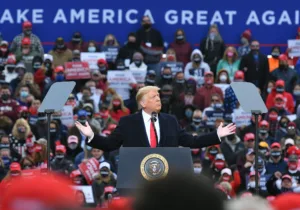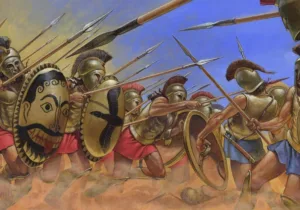Watching the Ken Burns-Lynn Novick PBS series on the Vietnam War put me in mind of a memorable essay that Jim Webb—Vietnam war hero, novelist, secretary of the Navy under Ronald Reagan, and most recently Democratic senator from the Commonwealth of Virginia—penned for the American Enterprise Institute seventeen years ago. In this remarkable piece, he called into question the popular idea of a “Vietnam generation.”
Webb noted that those who came of age during that war are more properly regarded not as a generation but as an age group, permanently divided by different reactions to a whole range of counter-cultural agendas, most importantly the personal ramifications of the war itself.
The sizable portion of the Vietnam age group who declined to support the counter-cultural agenda, and especially the men and women who opted to serve in the military during the Vietnam War, are quite different from their peers who for decades have claimed to speak for them. In fact, they are much like the World War II generation itself. For them, Woodstock was a side show, college protestors were spoiled brats who would have benefited from having to work a few jobs in order to pay their tuition, and Vietnam represented not an intellectual exercise in draft avoidance or protest marches but a battlefield that was just as brutal as those their fathers faced in World War II and Korea.
I believe Webb’s essay explains why Burns’ stated hope that his documentary will “help end divisions over the war and facilitate national healing” fails.
The divisions over Vietnam are deep and people on both sides of the divide have become invested in their respective positions. As someone who is proud of his service during the Vietnam War, I saw the series—touted as an even-handed portrayal of the war—as just another manifestation of the standard narrative advanced by those of the “Vietnam generation” who have somehow been anointed as spokesmen for all of us.
Let me be stark in describing the polar attitudes of those who came of age during the Vietnam era. On the one side in this culture war are those who believe that Vietnam wasn’t very different from other wars. The cause was just, but it was as affected by ambiguities as any other war, including World War II. In the end, the U.S. defeat was the result of strategic failure, not moral failure. Those who fought it were doing their duty as they saw it, just as their fathers and grandfathers had done theirs when the times demanded it of them.
On the other side are those for whom the Vietnam War represented the very essence of evil. The United States had no business fighting this war and could never have won it. It was not like other wars. All it did was wreck lives, American and Vietnamese. It was one continuous atrocity. War crimes were par for the course. Those who fought it were different from those who fought the “good war.” They returned home psychologically if not physically crippled–homeless, drug addicted, and likely to commit suicide.
I strongly suspect that those on the anti-war side of the Vietnam age group will feel vindicated by the series. It will give some of them tacit permission to continue to take their bearings, either directly or indirectly, from the hard-core opinion of those who believe that the Vietnam war represented all that is evil about America–capitalistic exploitation, racism, and imperialism. Noam Chomsky and H. Bruce Franklin exemplify this view. As the latter writes in “The Vietnam War and the Culture Wars,” Vietnam, far from being “an aberration, some kind of wayward ‘mistake’ by a nation long leading the world’s march to progress,” instead “typified the nation’s history from colonial settler regime to global empire.” Indeed, for Franklin, the Vietnam war was the culmination of the 600-year-old European crusade to oppress people of color throughout the globe–thus the mass murderer Lt. William Calley (My Lai) was only the latest manifestation of the spirit of that earlier mass murderer, Christopher Columbus.
Of course, there are many on the anti-war side who, less obnoxious, do not subscribe to the Chomsky-Franklin school. Nevertheless, these too will find confirmation—even a kind of catharsis—for their sentiments. If we were privy to their inner—post viewing—monologue, it might run this:
Our narrative was right. It was a war for nothing, merely an example of American hubris. The US effort was doomed from the beginning since the hubristic Americans had merely assumed the colonial mantle of the hated French. US leaders lied to the American people from the very beginning. The war may not have actually been the greatest crime of the twentieth century as some of us argued at the time, but the series proves that it certainly was a mistake of the highest order.
The American effort was also doomed because our Vietnamese opponents could not be defeated, since they were really nationalists fighting for independence. Meanwhile the South Vietnamese leaders were corrupt and the Army of the Republic of Vietnam (ARVN) soldiers were inferior to their communist counterparts. The Americans who fought in Vietnam may not really have been the baby killers we called them back then but they were largely reluctant warriors unified only by their desire to get the hell out of the country.
Such are the problems with the series. I was struck by the absence of certain voices. There is nothing from those who have offered reasoned defenses of both the purpose and conduct of the war, especially Jim Webb. There is no mention of Mark Moyar, who has written a revisionist study of the war, or of Bob Sorley’s important contribution to the study of the military leadership during the war, which has generated a lively debate among US Army historians. Sorley appears in the documentary, but if he was asked to talk about his revisionist history of the war, it must have ended up on the cutting room floor. I was stuck as well be the downplaying of the patriotism and sense of purpose that fortified the resolve of many of the Americans who served in Vietnam—including the two-thirds who volunteered. Absent too is any sense that the war might have been right to fight, even if, in the end, it was fought wrongly. Nor is there any real allowance that the war was fought wrongly in primarily strategic—rather than moral—dimensions.
As to the purpose of the war, it ought to be self-evident there was a just cause. Vietnam’s geographic position and cultural strengths made it, as David Halberstam wrote years ago, “one of only five or six nations in the world that is truly vital to United States interests.” The situation in Asia after World War II—the destruction generated by that war and the sudden end of European colonialism—made the region vulnerable to the spread of communism and the domination of the region by the Soviet Union and/or China. In 1950, the partitioned country of Korea exploded into war when the communist North invaded South Korea, with the Chinese Army joining the effort six months later. Subsequently, communist insurgencies erupted in Indochina, Malaysia, and Indonesia. The insurgency in Indonesia led to a Chinese-sponsored communist coup attempt, which was put down in 1965.
The Burns-Novick series downplays Ho Chi Minh’s background as a Soviet-trained communist, choosing to focus on his credentials as a nationalist intent on expelling the French from their former colony. But he had quickly consolidated his anti-French power base just after the war by assassinating the leadership of competing political groups that were both anti-French and anti-communist. The Korean War armistice of 1953, permitted the Chinese to shift large amounts of sophisticated weaponry to Ho Chi Minh’s army, contributing to the French defeat at Dien Bien Phu and the partition of Vietnam in 1954.
As it had done in both Europe and Asia after World War II, the United States sought to contain communist expansion. American action in Vietnam followed an existing pattern. The US had fought a war in Korea to prevent a communist takeover of the peninsula. It supported the Chinese nationalists after their expulsion from mainland China. US support for South Vietnam—recognized in international law and diplomacy as an independent sovereign entity possessing the right of self-defense against external aggression—was no different. Furthermore, American intervention was in keeping with Article 51 of the U.N. Charter, which recognizes the right of collective self-defense. As signatories of the Southeast Asian Treaty Organization, the United States pledged to defend South Vietnam from external aggression.
And the aggression was external. The Burns-Novick documentary persists in describing the Vietnam conflict as a civil war, accepting a central tenet of the anti-war narrative. But North Vietnam invaded South Vietnam, just as certainly as North Korea invaded South Korea.
The North Vietnamese and their American supporters dismissed US scholars of Vietnamese communism such as the late Douglas Pike who long ago made this claim. But in 1983, General Vo Nguyen Giap and Vo Bam admitted that indeed, the 15th plenum of the Lao Dong party decided in 1959 to begin the armed struggle against the Saigon government. To support this decision, the North Vietnamese built the “Ho Chi Minh” Trails through Laos and Cambodia, in violation of those countries’ neutrality, over which men and supplies moved long before the decision was made to land American combat units in 1965. The admission by Giap and Bam, in fact, confirms the justification of US action in Vietnam.
Indeed, the just cause of US action in Vietnam is partly underscored by the cost of American defeat. Failure came at a high price, paid especially by the South Vietnamese and Cambodians: in addition to Saigon’s war dead we must count the thousands of summary executions at the hands of the Communist liberators, a million and a half “boat people,” a like number of individuals sentenced to “reeducation camps,” genocide in Cambodia, and a perceived shift in the “correlation of forces” that encouraged Soviet adventurism throughout the 1970s. The avoidance of such a costly “liberation” of South Vietnam was a worthy war aim. Our failure to achieve it—especially when that failure is rooted in muddle-headed and irresponsible US civilian and military leadership—is a tragedy.
But the documentary elides all this. Worse, instead of a fair accounting of justified US war aims, Burns-Novick posits a moral equivalence between the goals and conducts of both sides of the belligerents. It is against this supposition that I will write tomorrow.
—
Mackubin Thomas Owens is a Providence contributing editor, the dean of academics at the Institute of World Politics, and editor of Orbis. He is the author of US Civil-Military Relations After 9/11: Renegotiating the Civil-Military Bargain.Mac is a Marine Corps veteran of Vietnam, where as an infantry platoon and company commander in 1968-1969, he was wounded twice and awarded the Silver Star medal. He retired as a Colonel in 1994. Follow him @MacOwens4
—
Image: U.S. Army Bell UH-1D helicopters airlift members of the 2nd Battalion, 14th Infantry Regiment from the Filhol Rubber Plantation area to a new staging area, during Operation “Wahiawa”, a search and destroy mission conducted by the 25th Infantry Division, northeast of Cu Chi, South Vietnam, 1966. wikipedia commons






 Sponsor a student for Christianity & National Security 2024
Sponsor a student for Christianity & National Security 2024